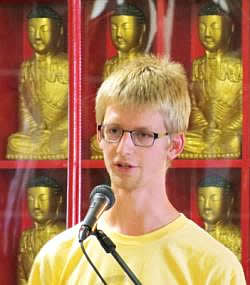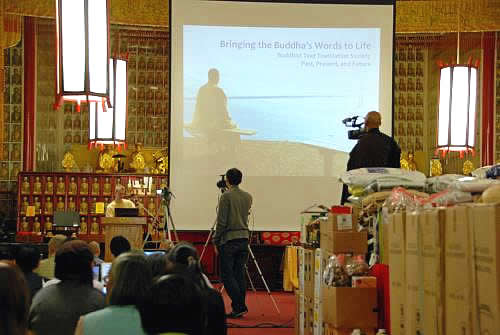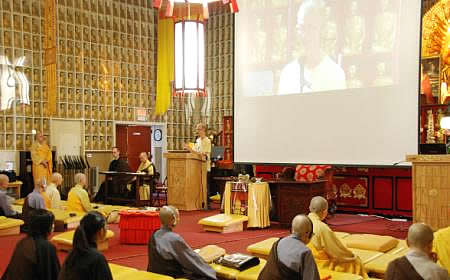 |
|
Translation and Dharma Parties
A talk given by Fedde de Vries on October 7, 2012

Dharma Masters, Dharma Friends – good evening!
Today is my chance to speak. My name is Fedde de Vries and my Dharma name is Qin De. Before I speak on my topic of this evening, let me perhaps re-introduce myself a bit more. I am from Europe, the Netherlands, and my first stay was 3 year ago. That was during a program on the Shurangama Sutra organized by DRBU. That summer I had just graduated from High School and was about to go to college. After one year, I came back; and then last year I did not come back. My excuse was that you came to me. Or at least, part of you, as there was a DRBA delegation to Europe.
This summer, having finished my Ba. Degree in Religious Studies, I came back for the Anniversary of Master Hua’s Coming to the West and have stayed at Berkeley Buddhist Monastery and here in the City of Ten Thousand Buddha’s ever since. Now, one may – as people quite often do – ask how this young, regular Dutch boy, got to come to the monastery. That is a good question, but I am too lazy to answer it this evening. (You may read about it in my essay for the Anniversary – see August VBS.) I have another topic this evening.
To start out I would like you to bring to mind a party, and I mean a real party with a group of people coming together, having a good time. They share good stories and encourage each other. They also show each other photos every now and then, to illustrate something about what they are saying. When people go away, they are happy. But of course, there was also lots of work to prepare beforehand, and there are dishes to do afterwards.
Now you might be thinking I want to talk about some memories of my college-life; or perhaps you are having memories from your own college-life. Perhaps you are being happy you got away from such impure, worldly matters…
Well… I was in fact referring to a type of party that occurs here in the City of Ten Thousand Buddhas multiple times per week. These are Dharma Parties. Beforehand, there is hard work in getting a translation text prepared to work from. Afterwards, people need to do the dishes, that is, incorporated the new decisions made for the translation and do their research and homework for the next session. The participants all enjoy working on the Dharma like this, trying to understand the Chinese, the Dharma that it teaches, and finding the right English words to capture that meaning – that is why from time to time they look for pictures to illustrate their ideas. People leave elevated, happy, filled with some more wisdom light: they had a chance to study the Dharma and be with good teachers and wholesome friends; and: they had had a chance to plant blessings as they worked on making the Dharma available for new audiences.
Now, wouldn’t you say this is a real party? And wouldn’t you say this is a wholesome type of party?
In fact, I myself am glad to be away from college-life’s party and be here. Actually, I realize I go to more parties being here than I did while in college.
So I wanted to say some words on translation this evening as I have been helping out a bit with BTTS. Let me start by offering a quote from Master Hua that I think shows how much he thought translation was important:
Let us all translate the Sutras and open the source of wisdom for the people of the West, so that Easterners and Westerners can all come to understand the Buddhadharma. Everyone should make that his or her goal. We shouldn’t think on our own behalf; we should think on behalf of the people who live hundreds and thousands of years in the future. We want to make it easy for them to study the Buddhadharma and understand the Buddhadharma. That’s our goal. That’s why we are making such strenuous efforts and undergoing so much hardship here.
The Master, we may recall, made a vow to oversee the translation of Buddhist texts very early on in his life and if you read his instructions on translation it is obvious why it is listed as one of his 4 legacies: Master Hua thought it was really important to translate Buddhist Sutras. For me personally, I actually came to DRBA through translations. That is not only by reading BTTS’s publications, but also by doing some translation to Dutch on my own and then contacting people from CTTB.
Now on the 26th of August, Ullambana, we had a presentation on BTTS. We learned about all the ongoing projects and we learned about future prospects. People also shared ideas on how to make our books available and be sure people know about them. Some of these ideas are now taking off, such as new ideas for distribution, or the call to make e-books available. Also, people are preparing to create BTTS online newsletters, so that people can learn about our publications and get the chance to encounter Wholesome Dharma. Hard work is being done in those areas. And of course, also translation efforts continue to increase: people are working on the Avatamsaka, both with and without commentary, on the Master’s talks (e.g. fajieweixin), the Lotus Sutra, the Sutra of Golden Light, the Earth Store Sutra, a Chronicle of the Master’s Life, the Compassionate Water Repentance; And just today I learned that Dharma Master Jin Yan’s group that works on the 10,000 Buddhas’ Names is to finish in a few days.
Now I am sure there are people here who cannot but agree with Master Hua that translation is important to reach non-Chinese speakers – well that is a no-brainer isn’t it – but these people might still feel they themselves cannot contribute as they have no Chinese, or no to very little English. I would like to encourage you to change that idea and feel empowered, have some more confidence. Especially when translations are done in a team, we can all work together. If everyone contributes his wisdom and leaves behind attachment to small minded opinions, real translations of good quality get produced even if there may be no one in the room who is fluent in both languages. Furthermore, even without English you may help, for example by doing research. A current case is in the Ten Transferences group we encountered the color of the Buddha’s finger. As we had no quick way of pinning down the exact meaning, we are asking Dharma Master Jin Fan and his group to look into this and report back later. Furthermore, it may help Chinese learners who are in the team if there is pinyin. So if there are volunteers who can type out the pinyin for a working file, that is always very helpful.
Translation is a way of being close to the text, to the Dharma. Computers can help, but as they cannot understand the Dharma, they cannot translate. We have to rely on people and their inherent wisdom. As we translate together or check each other’s translations, we make sure the translation accords with the Buddha’s principles and we develop our own wisdom.
But of course, in the process of translating, we also learn language. Those who are new to Chinese, learn some more Chinese; and those who are new to English, get a chance to make progress – you will amaze your ESL teacher!
So right now there is this location in the DRBU building where Dharma parties are being held more than weekly. It is my hope that that room will be in use all the time, with teams coming in one after the other. And then we will need new translation rooms – CTTB would surely shine even more light then! And I am sure Master Hua would be smiling, blessing those who help spread the Buddhadharma.
Well, perhaps I got a bit carried away here, and I am dreaming a bit too much. If so, I apologize; and if I said anything incorrect, please do correct me. Meanwhile, let me read you one more quote from Master Hua in closing:
No matter who you are, if you use your wisdom to translate Sutras, your wisdom will become greater day by day. The growth of wisdom takes place day after day. If you concentrate your mind and devote yourself to studying every day, your wisdom will open up.


